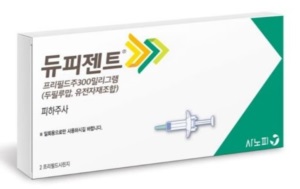Sanofi’s new biologic agent Dupixent (ingredient: dupilumab) for severe atopic dermatitis is unlikely to obtain insurance benefit within this year, observers said.
The Health Insurance and Review and Assessment Service (HIRA) on Thursday held a meeting of the Pharmaceutical Reimbursement Evaluation Committee, but the review board did not put the Dupixent issue on the agenda.

Minister of Health and Welfare Park Neung-hoo had said in the National Assembly that the ministry was reviewing setting up a code for severe atopic dermatitis and giving health insurance benefit to the treatment. He had also promised that he would work with the drugmaker to make the drug reimbursable as soon as possible.
Park’s comments gave hope to patients that they could have insurance benefit when using the drug.
However, the drug reimbursement review meeting did not include a discussion for Dupixent, signaling that the drug is unlikely to get a reimbursement within this year. HIRA said the discussion for giving insurance benefit to Dupixent could start as early as in October.
“If it passes the HIRA’s drug reimbursement review and goes through the Ministry of Health and Welfare’s Health Insurance Policy Review Committee, it could win insurance benefit in early next year,” an official at HIRA said.
The official went on to say that the health authorities were closely working with Sanofi to make Dupixent reimbursable through risk-sharing agreement.
Patients with severe atopic dermatitis are anxiously waiting for the HIRA’s drug reimbursement evaluation committee to discuss the matter.
Dupixent is the only biologic drug authorized to treat atopic dermatitis. It is also the only treatment for patients with severe atopic dermatitis whose symptoms do not improve with conventional systemic therapies.
It costs about 20 million won ($16,515) a year for patients to use Dupixent.
Early this year, the Association of Patients with Severe Atopic Dermatitis staged one-person protests in front of the National Assembly, visited offices of the members of the National Assembly's Health and Welfare Committee, filed complaints with the health and welfare ministry and HIRA, and visited Sanofi’s office to push for the Dupixent reimbursement.
The medical community, including the Korean Atopic Dermatitis Association, also paid close attention to the issue by holding a debate to urge the government to support severe atopic dermatitis patients. They are also making an effort to raise awareness of the disease and improve the treatment environment.
As the HIRA skipped the discussion on Dupixent Thursday, the Association of Patients with Severe Atopic Dermatitis decided to hold a rally in front of the HIRA’s head office on Sept. 4.
“I’ve trusted the HIRA even though it has kept delaying the reimbursement review (for Dupixent) from June to July, and to August. However, I can’t trust it anymore,” said one patient with severe atopic dermatitis, who has been joining the association’s rally.

